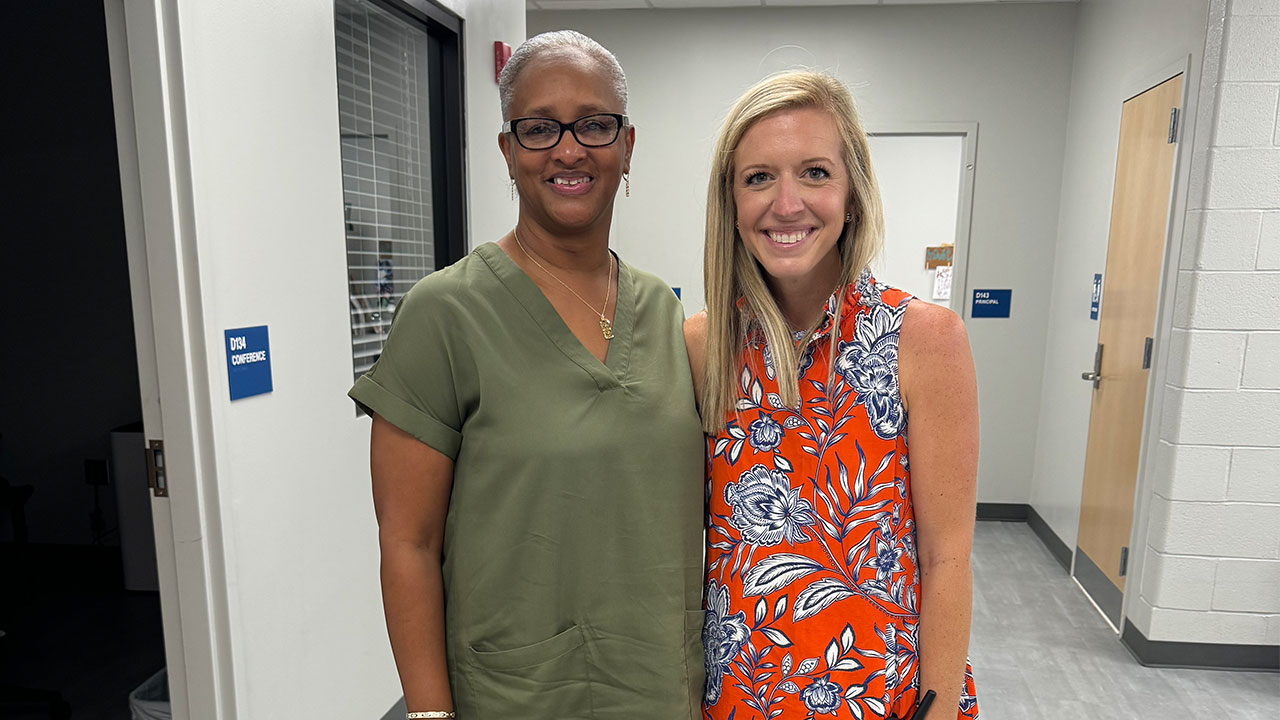content body

College of Education alumna and Reeltown Elementary Principal Kathryn Conradson is pictured standing next to a sign that reads: "Rooted in Tradition. Blooming in Purpose!"
On her first day as principal of Reeltown Elementary School, Kathryn Conradson stood in the quiet morning halls and felt the weight of new leadership. She had the credentials — four degrees from Auburn University’s College of Education, including a doctorate in school leadership — and years of classroom and administrative experience. But what she didn’t expect was how transformative it would be to also have someone walking alongside her.
“Leadership can sometimes feel isolating, especially as a new school leader,” Conradson said. “Having a trusted mentor I can turn to for guidance, support and perspective has been invaluable.”
That support came through the Alabama New Principal Mentoring Program, or ANPMP, a statewide initiative co-created by Ellen Hahn, a professor in Auburn University’s College of Education. Hahn is a founding member of the program’s design team and a leading researcher on principal mentoring and administrator well-being.
According to national data, the average tenure of a school principal is about four years. High turnover can lead to less experienced leadership and negative impacts on student achievement, growth and school culture. The ANPMP was created to change that trajectory.
The team selected by the Council for Leaders in Alabama Schools, or CLAS, to design and implement the program includes mentoring experts and members of the International Mentoring Association: Yvette Bynum, a 2010 Auburn graduate; Brenda Mendiola of the University of Alabama; Ellen Reames-Hahn, a 1997 Auburn graduate; and Linda Searby, who earned degrees from Auburn and the University of Florida.

Ellen Hahn, a professor in Auburn University’s College of Education, is a founding member of the Alabama New Principal Mentoring Program.
Fostering strong relationships
Their work began in fall 2023 in consultation with CLAS leaders Vic Wilson and Demica Sanders, as well as Anna Shepherd-Jones and Telena Madison from the Alabama State Department of Education. The team delivered a polished mentor curriculum in fall 2024 and continues to align mentoring with the Alabama Principal Leadership Development System.
Rhonda Wheeler, a 2024 Auburn graduate, serves as the program’s mentoring coordinator. She facilitates mentor training, matches mentors with mentees and assists with ongoing training efforts.
The matching process is designed to foster strong relationships. Mentees review mentor profiles and provide input on preferred matches, with emphasis on shared values, leadership styles and grade-level experience. Mentors — recently retired Alabama principals — are selected based on their leadership success by the CLAS Mentor Design Team.
Auburn’s Educational Leadership Program graduates are deeply involved as mentors, mentees, designers and administrators.
Hahn has been collecting data on Alabama principal stress, burnout and mentoring for well-being for the past five years. Her research shows that mentor training matters and that effective mentors build confidence, lead by example and communicate frequently.
“We used statewide data and researched best mentoring practices to build a program specifically designed for Alabama school principals,” Hahn said.

Auburn College of Education alumna Kathryn Conradson, right, is pictured with her mentor, Beverly Price, a 2008 Auburn graduate who previously worked with Conradson in Alexander City Schools.
Cultivating commitment
The program emphasizes intentionality, regular contact and reflective practice. Mentors and mentees meet monthly in person, engage in guided conversations, journal after each session and maintain weekly contact through texts, phone calls and Zoom meetings.
“Mentorship is about more than guidance — it’s about cultivating resilience, confidence and a commitment to stay,” Hahn said. “We’re building a system that not only prepares principals to lead but helps them thrive long term.”
Conradson joined the program just as she stepped into her new role last summer. She said the timing was ideal.
“I became a principal last summer just as the Alabama New Principal Mentoring Program was launching,” she said. “I’ve been incredibly fortunate to participate from the start and to work with a mentor who has truly invested in my growth.”
Now entering its second year, the ANPMP is a core component of Alabama’s Principal Leadership Development System, established under the School Principal Leadership and Mentoring Act (Act 2023-340). The program provides two years of structured, non-evaluative mentorship focused on five domains of principal effectiveness: visionary, instructional, managerial and operational, relational and innovative leadership.
Her mentor, Beverly Price, a 2008 Auburn graduate, previously worked with Conradson in Alexander City Schools.
“We have a strong professional relationship built on trust and mutual respect,” Conradson said. “She brings a wealth of knowledge and insight, and I always feel supported after our conversations.”

Kathryn Conradson (top right) is pictured with coworkers in a meeting in her role as principal of Reeltown Elementary School.
Grounded in purpose
Conradson said one of the most impactful lessons she’s learned through the program is the value of proactive problem-solving and shared language in driving schoolwide change.
“This year, I’ve led the implementation of a schoolwide behavior plan and established clear grading guidelines,” she said. “Creating a common language around expectations and assessment has not only improved communication but also strengthened our school culture and student outcomes.”
She said her favorite part of the program is its consistency.
“Even with the busyness of school life, my mentor makes it a priority to meet regularly,” Conradson said. “Those intentional, focused conversations help me stay grounded and reflect on both challenges and successes.”
In addition to the mentoring program, Conradson credits Auburn’s College of Education for setting the foundation for her success.
“Auburn’s College of Education played a significant role in shaping the educator I am today,” she said. “I completed my undergraduate, specialist and doctoral degrees at Auburn, and in each phase, I was supported by professors who were invested in my success.”

A caring community
She added that Hahn was a key mentor throughout her academic journey.
“Dr. Hahn recruited me, taught me and encouraged me to complete my Ed.S. and Ph.D. Her mentorship and guidance prepared me for every role I’ve held in education,” Conradson said. “Growing up in a family of Auburn graduates and attending sporting events as a child, I’ve always loved Auburn. But as an adult, I’ve come to appreciate that it’s more than a beautiful campus or gameday experience. Auburn’s College of Education is a community that truly cares about preparing educators to lead with purpose and integrity.”
As she continues to lead Reeltown Elementary with purpose and heart, Conradson said she remains thankful for the support she’s received.
“I am incredibly grateful that Alabama is investing in new school leaders through the Alabama New Principal Mentoring Program,” she said. “Knowing that we’re one of only six states with this kind of support makes me even more appreciative. This program has made a meaningful difference in my transition to school leadership, and I believe it will continue to strengthen education across our state.”
Hahn said that’s exactly the kind of impact the program was designed to achieve.
“The ANPMP is about building confidence, commitment, competence and connection through core values,” Hahn said. “Katy and her mentor, Dr. Beverly Price, are shining examples of what this program was designed to do. I am so proud to have been selected to help create and implement this wonderful program, and I am also proud of all the Auburn graduates who have significant roles in it.”




